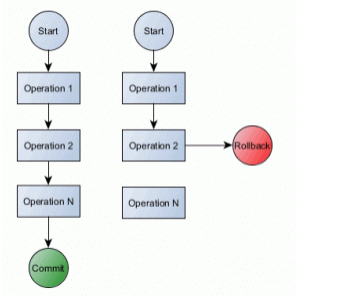Introduction to database management systems
Chapters
A word on database transaction and ACID model
A transaction is a unit of program execution that accesses and possibly updates various data items. A transaction must see a consistent database. During transaction execution database may be inconsistent. When transaction is committed, database must be consistent.

Img source: vladmihalcea
The ACID model is one of oldest and most important concepts of database theory.
-
Atomicity states that database modifications must follow an all or nothing rule. Each transaction is said to be atomic. If one part of transaction fail, entire transaction fail. It is critical that database management system maintain atomic nature of transactions in spite of any DBMS, operating system or hardware failure.
-
Consistency states that only valid data will be written to database. If, for some reason, a transaction is executed that violates databases consistency rules, entire transaction will be rolled back and database will be restored to a state consistent with those rules.
- Isolation the transaction runs in isolation, it appears to be only action that system is carrying out at one time. If there are two transactions that are both performing same function and are running at same time, transaction isolation will ensure that each transaction thinks it has exclusive use of system.
- Durability ensures that any transaction committed to database will not be lost. Durability is ensured through use of database backups and transaction logs that restoration of committed transactions in spite of any subsequent software or hardware failures.
Description
This free tutorial covers the basics of database management system to help you with your understanding on the topic, Please note that this tutorial assumes that either you are a beginner or just want to brush up your understanding on DBMS
Tutorial covers the topics below
- What is DBMS?
- Architecture
- Data Models
- Data Schemas
- Data Independence
- Entity-Relation Model Basic Concept
- Entity-Relation Diagram Representation
- Generalization, Aggregation
- Codd's 12 Rules
- Relational Data Model
- Relational Algebra
- Structured Query Language
- Normalization
- Database Joins
- Storage System
- Indexing
- Hashing
- Transaction
- Concurrency Control and Deadlock
- Data Backup and Recovery
Audience
Absolute beginners or students who wish to brush up their understanding on DBMSes
Author: Subject Coach
Added on: 16th Sep 2015
You must be logged in as Student to ask a Question.
None just yet!